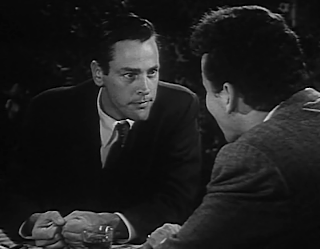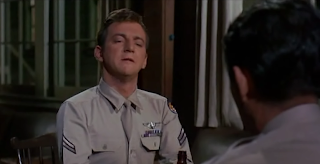Kevin McCarthy received his only Oscar nomination for portraying Biff Loman in Death of a Salesman.
Kevin McCarthy portrays the son of the titular salesman Willy Loman (Fredric March). I will admit there is plenty against McCarthy here. The film is directed is an excessively dreary fashion, and is lead by a preposterous performance by March, and McCarthy himself shares many scenes with Mildred Dunnock as Biff's mother who gives an excessively overbearing performance. It also does not help that the structure of the picture certainly does not give McCarthy a great deal of focus to really showing the transition of just exactly how Biff came into his current state. There is the initial cause that is shown, but the film never of course leaves his character out of somehow connected with his father.
Although McCarthy is surrounded by some excessively theatrical acting that wants to get there character's point across like they are trying to reach the back row of a theater rather than someone seeing every inch of their face right there on the film, McCarthy actually does stand apart from most of his co-stars by giving a far more realistic and a far less overblown of a performance. McCarthy manages to keep his performance dialed back, and does attempt to draw a believable character out of the material. This is in itself a challenge because the film always seems to be making the character's simply representative symbolic types, rather than a stand alone person, luckily McCarthy does actually try to be a real person as Biff.
Kevin McCarthy is good in the flashbacks scenes as the ideal son of the period. In these scenes McCarthy effectively has a carefree quality in his performance that shows that Biff is not having any sort of deep thinking about his father or his own future at this point in his life. McCarthy is believable as the happy son who gets along well with his father, and he makes the relationship properly ideal, even though March still seems off even in these scenes. Nevertheless McCarthy properly sets up the fall of his character after Biff loses all of the pride he had in regard to his father after he catches his father with a woman. McCarthy actually is great in this scene quietly bringing to life just how shattered Biff is over losing his respect he had.
McCarthy in that scene shows so well Biff's pain over his loss of his connection with his father that McCarthy effectively explains how Biff came to the point where he is during the scenes of the film that take place during the present. In most of his present scenes McCarthy does one of two things talk about Biff's own inability to make something of himself or fight with his father over his father's narrow minded views that have driven him mad. McCarthy actually again handles both of these types of scenes well, and does his very best to turn Biff's struggles to life despite being around March and Dunnock's theatrics.
McCarthy manages to bring to life the confused state Biff well. Biff is unable to keep a job one way or another, and has no idea what he wants to do with himself. McCarthy portrays this confusion well he never shows exactly what makes Biff the way he is, but rather there is always a lack of confidence he shows within Biff that defies him. McCarthy is equally effective in his scenes where he confronts Willy. McCarthy again is strong here because he shows that there is indeed love in Biff for his father, but rather his problems with his father almost come entirely from knowing his father's rigid philosophy leads to nothing worth while. Even in his more frustrated scenes McCarthy properly shows that there is no hatred for his father, but only disappointment and pain over what his father is. Kevin McCarthy is quite effective in the role, but I will say this effectiveness is quite muted by the mediocrity of the film on a whole. McCarthy has no equal here, and his scenes do not have the power they possibly could have had if the film had simply been better. Still McCarthy makes the most out of his part given the situation and deserves to recognized for doing so.
Kevin McCarthy portrays the son of the titular salesman Willy Loman (Fredric March). I will admit there is plenty against McCarthy here. The film is directed is an excessively dreary fashion, and is lead by a preposterous performance by March, and McCarthy himself shares many scenes with Mildred Dunnock as Biff's mother who gives an excessively overbearing performance. It also does not help that the structure of the picture certainly does not give McCarthy a great deal of focus to really showing the transition of just exactly how Biff came into his current state. There is the initial cause that is shown, but the film never of course leaves his character out of somehow connected with his father.
Although McCarthy is surrounded by some excessively theatrical acting that wants to get there character's point across like they are trying to reach the back row of a theater rather than someone seeing every inch of their face right there on the film, McCarthy actually does stand apart from most of his co-stars by giving a far more realistic and a far less overblown of a performance. McCarthy manages to keep his performance dialed back, and does attempt to draw a believable character out of the material. This is in itself a challenge because the film always seems to be making the character's simply representative symbolic types, rather than a stand alone person, luckily McCarthy does actually try to be a real person as Biff.
Kevin McCarthy is good in the flashbacks scenes as the ideal son of the period. In these scenes McCarthy effectively has a carefree quality in his performance that shows that Biff is not having any sort of deep thinking about his father or his own future at this point in his life. McCarthy is believable as the happy son who gets along well with his father, and he makes the relationship properly ideal, even though March still seems off even in these scenes. Nevertheless McCarthy properly sets up the fall of his character after Biff loses all of the pride he had in regard to his father after he catches his father with a woman. McCarthy actually is great in this scene quietly bringing to life just how shattered Biff is over losing his respect he had.
McCarthy in that scene shows so well Biff's pain over his loss of his connection with his father that McCarthy effectively explains how Biff came to the point where he is during the scenes of the film that take place during the present. In most of his present scenes McCarthy does one of two things talk about Biff's own inability to make something of himself or fight with his father over his father's narrow minded views that have driven him mad. McCarthy actually again handles both of these types of scenes well, and does his very best to turn Biff's struggles to life despite being around March and Dunnock's theatrics.
McCarthy manages to bring to life the confused state Biff well. Biff is unable to keep a job one way or another, and has no idea what he wants to do with himself. McCarthy portrays this confusion well he never shows exactly what makes Biff the way he is, but rather there is always a lack of confidence he shows within Biff that defies him. McCarthy is equally effective in his scenes where he confronts Willy. McCarthy again is strong here because he shows that there is indeed love in Biff for his father, but rather his problems with his father almost come entirely from knowing his father's rigid philosophy leads to nothing worth while. Even in his more frustrated scenes McCarthy properly shows that there is no hatred for his father, but only disappointment and pain over what his father is. Kevin McCarthy is quite effective in the role, but I will say this effectiveness is quite muted by the mediocrity of the film on a whole. McCarthy has no equal here, and his scenes do not have the power they possibly could have had if the film had simply been better. Still McCarthy makes the most out of his part given the situation and deserves to recognized for doing so.


























































